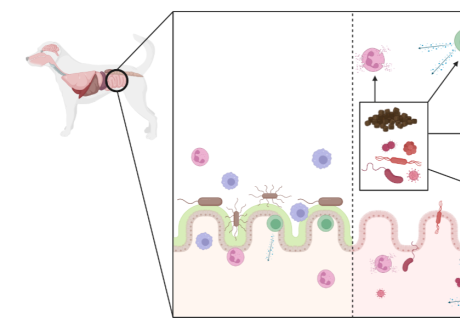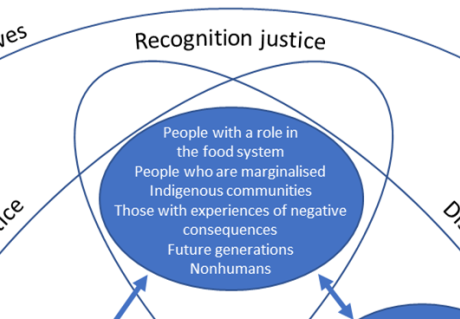
Recognising animals as subjects of justice in food system transitions
WIAS Magazine – Summer edition 2023
Research Highlight
Keywords: Food system · Justice · Nonhumans · Animals
Researchers aim to contribute to more sustainable and just food systems by investigating the challenges and opportunities of current and future food systems. Examples of such investigations in the WIAS graduate school include research done on resource use efficiency, animal welfare, and the implications of dietary changes on circular food systems. As researchers we play an active role in food system transitions when we decide what topics to work on and how we design our research, analyse the data, and write about our findings. In addition to researchers, many actors across the food system, including farmers, consumers, as well as political and financial actors, engage in numerous food system initiatives at local, regional, and national scales. These initiatives aim to address unsustainable practices and social injustices in different ways, depending on whether they frame food as a commodity, a human right, or a common good (1). They also differ in whether, and if so how radically, they want to change the global corporate food regime (2,3). Throughout the research process researchers also enact different framings of food and how radically they want to contribute to changing the dominant food regime towards a more sustainable and just food system. However, researchers are not always clear about what they consider sustainable and/or just.
In our paper “Easier Said than Defined? Conceptualising Justice in Food System Transitions” (4) we investigated which conceptualisations and principles of justice researchers enact when writing about food system initiatives. We developed an initial framework that consists of four elements. The first is recognition justice, which relates to who is recognised by researchers as subject of justice. The second is distributive justice, which looks at what is (re)distributed between whom and the third is procedural justice, which relates to how decisions are made. The fourth element, principles of justice, looks at the principles used by researchers to describe whether a certain situation or claim is (un)just. These principles can be egalitarian, rights-based, or desert-based.
We undertook an extensive review of the food system transitions literature using this framework and were able to identify a range of recognition, distributive, and procedural justice conceptualisations and associated principles of justice. The review showed that researchers recognised the following six groups as subjects of justice: those with a particular role in the food system, people who are marginalised, Indigenous communities, those with experiences of negative consequences of the food system, future generations, and nonhumans. The conceptualisations and principles of justice we found are visualised in Figure 1. In the rest of this article we highlight the parts of the paper that discussed nonhumans, including animals, as this group is particularly relevant to WIAS researchers.

Figure 1: Justice conceptualisations and associated principles of justice used within the food systems literature to describe and discuss implications (Directly taken from de Bruin et al., 2023 under https://creativecommons.org/licenses/by/4.0/)
In the paper (4) we explored some of the philosophical roots of recognising nonhumans as subjects of justice: “Where Western philosophers initially considered humans to be the main subjects of justice, recent work has argued that the moral community should be extended to include nonhumans. Nussbaum (5) has argued that we have an obligation towards individual sentient animals and their capabilities. […] Multispecies justice then argues that humans have an obligation to nonhumans as humans interrelate and affect nonhuman dignity (6). In this justice perspective nonhumans include not only individual animals, plants, or ecosystems, but “species, microbiomes, ecosystems, oceans, and rivers - and the interrelations among and across them” (7, p.127).”
The results of our review show that papers describing food system initiatives recognised farm animals, biodiversity, and natural resources such as land and water as subjects of justice. Many initiatives described in the papers referred to producers engaging in practices that reduced negative environmental impacts of food production or allowed animals to behave naturally. We consider these examples of distributive justice issues, as the health and wellbeing of nonhumans was redistributed between producers and nonhumans in terms of respect, solidarity, and conviviality. Consumers’ willingness to recognise and pay for the efforts of producers to improve the health and wellbeing of nonhumans reflected the justice principles of contribution, need, and compensation. In terms of procedural justice, the papers we analysed recognised how nonhumans influenced and were influenced by food system initiatives. However, they did not refer to nonhumans as taking part in decision making processes.
In the discussion of the paper we reflect on the recognition of nonhumans as subjects of justice in food system transitions and connect it with the recent work done on reframing farm animals as a commodity to animals with intrinsic values and emotions. We encourage researchers to explore how they can recognise nonhumans as subjects of justice within their research. A starting point might be to actively include nonhumans, or their human representatives, throughout the research process as described by e.g. Bastian et al. (8). Overall, we challenge researchers to be more explicit about who they do and do not recognise as subjects of justice and which principles of justice they use. Such clarity will support a reflexive and inclusive debate about how research contributes to a just transition towards sustainable and just food systems.
References
1. Jackson, P., M.G. Rivera Ferre, J. Candel, A. Davies, C. Derani, H. de Vries, V. Dragović-Uzelac, A.H. Hoel, L. Holm, E. Mathijs, P. Morone, M. Penker, R. Śpiewak, K. Termeer, and J. Thøgersen. 2021. Food as a commodity, human right or common good. Nature Food 2(3): 132–134.
2. Holt-Giménez, E., and A. Shattuck. 2011. Food crises, food regimes and food movements: rumblings of reform or tides of transformation? The Journal of Peasant Studies 38(1): 109–144.
3. Alkon, A. H. 2014. Food Justice and the challenge to Neoliberalism. Gastronomica 14(2): 27–40.
4. de Bruin, A., I.J.M. de Boer, N.R. Faber, Gjalt de Jong, K.J.A.M. Termeer, and E.M. de Olde. “Easier Said than Defined? Conceptualising Justice in Food System Transitions.” Agriculture and Human Values, 2023
5. Nussbaum, M. C. 2007. Frontiers of justice: disability, nationality, species membership. The Tanner Lectures on human values. Harvard University Press, Belknap Press.
6. Fulfer, K. 2013. The Capabilities Approach to Justice and the Flourishing of Nonsentient Life. Ethics and the Environment 18(1): 19.
7. Celermajer, D., D. Schlosberg, L. Rickards, M. Stewart-Harawira, M. Thaler, P. Tschakert, B. Verlie, and C. Winter. 2021. Multispecies justice: theories, challenges, and a research agenda for environmental politics. Environmental Politics 30(1–2): 119–140.
8. Bastian, M., O. Jones, N. Moore, and E. Roe, eds. 2017. Participatory research in more-than-human worlds. 1st ed. New York, NY: Routledge.





